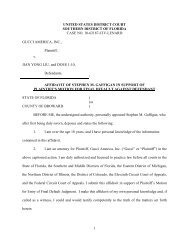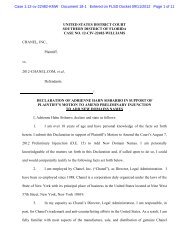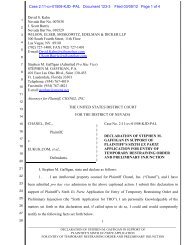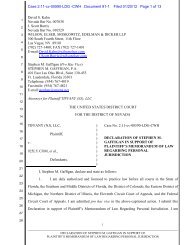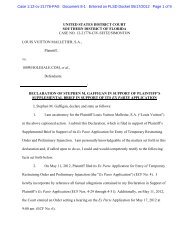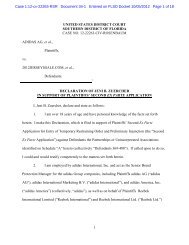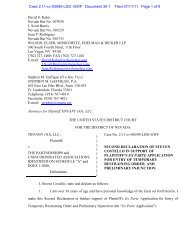UNITED STATES DISTRICT COURT SOUTHERN DISTRICT OF ...
UNITED STATES DISTRICT COURT SOUTHERN DISTRICT OF ...
UNITED STATES DISTRICT COURT SOUTHERN DISTRICT OF ...
You also want an ePaper? Increase the reach of your titles
YUMPU automatically turns print PDFs into web optimized ePapers that Google loves.
Case 0:10-cv-61942-MGC Document 5-6 Entered on FLSD Docket 10/14/2010 Page 49 of 75<br />
Article 75. Time periods shall include those prescribed by law and those designated by a people's court.<br />
Time periods shall be calculated by the hour, the day, the month and the year. The hour and day from which a time period begins shall not<br />
be counted as within the time period.<br />
If the expiration date of a time period falls on a holiday, then the day immediately following the holiday shall be regarded as the expiration<br />
date.<br />
A time period shall not include traveling time. A litigation document that is mailed before a deadline shall not be regarded as overdue.<br />
Article 76. If a party fails to meet a deadline due to force majeure or for other justified reasons, he may apply for an extension of the time<br />
limit within 10 days after the obstacle is removed. The requested extension shall be subject to approval by a people's court.<br />
SECTION 2 SERVICE<br />
Article 77. A receipt shall be required for every litigation document that is served and it shall bear the signature or seal of the recipient of the<br />
service and the date of receipt.<br />
The date of receipt as signed by the recipient of the service shall be regarded as the date the document is served.<br />
Article 78. Litigation documents shall be served directly on the recipient of the service. If the recipient of the service is a citizen, the<br />
documents shall, in the case of his absence, be receipted by an adult member of his family living with him. If the recipient of the service is a<br />
legal person or any other organization, the document shall be receipted by the legal representatives of the legal person or the principle<br />
leading personnel of any other organization or the personnel of the legal person or any other organization in charge of receiving such<br />
documents; If the recipient of the service has an agent ad litem, the documents may be receipted by the agent ad litem. If the recipient of<br />
the service has designated an agent to receive his litigation documents and has informed the people's court of it, the documents may be<br />
receipted by the agent.<br />
The date of receipt as signed by the adult family member living with the recipient of service, or persons in charge of receiving documents of<br />
legal persons or other organizations, or agents ad litem, or agents designated to receive his documents shall be regarded as the date the<br />
document is served.<br />
Article 79. If the recipient of the service of a litigation document or the adult family member living with him refuses to accept a legal<br />
document, the person serving the document shall ask representatives from the relevant grassroots organization or the unit to which he<br />
recipient of the service belongs to appear on the scene, explain the situa ion to them, and record on the receipt the par iculars of the refusal<br />
and the date of it. After the person serving the document and the witnesses have affixed their signatures or seals to the receipt, the<br />
document shall be left at the place where the recipient of the service stays and the service shall be considered completed.<br />
Article 80. If direct service of a litigation document proves difficult, service of the document may be entrusted to another people's court, or it<br />
may be served by post. If a document is served by post, the date as stated on the receipt shall be regarded as the date the document is<br />
served.<br />
Article 81. If the recipient of the service is in the military, the document shall be forwarded to him by the political organ at or above the<br />
regimental level in the unit to which he belongs.<br />
Article 82. If the recipient of the service is undergoing imprisonment, the document shall be forwarded to him by the prison or unit of reform<br />
through labour where he is serving his term.<br />
If the recipient of the service is undergoing rehabilitation through labour, the document shall be forwarded to him by the unit supervising his<br />
rehabilitation through labour.<br />
Article 83. Any organization or unit that receives a litigation document to be forwarded must immediately deliver it to the recipient of the<br />
service for a receipt. The date as stated on the receipt shall be regarded as the date the document is served.<br />
Article 84. If the whereabouts of a recipient of the service is unknown, or if a document cannot be served by the other methods mentioned in<br />
this section, the document shall be served by public announcement. Sixty days after the date of the public announcement, the document<br />
shall be deemed to have been served.<br />
The reasons for service by public announcement and the procedures taken shall be recorded in the case files.<br />
CHAPTER VIII CONCILIATION<br />
<br />
Article 85. In handling civil cases, the people's court shall distinguish between right and wrong and conduct conciliation on the basis of the<br />
principle of voluntariness of the parties and evident facts.<br />
Article 86. When a people's court conducts a conciliation, a single judge or a collegial panel may preside. Conciliations shall be conducted<br />
locally whenever possible.<br />
When a people's court conducts a conciliation, it may employ simplified methods to notify the parties and witnesses to appear in court.<br />
Article 87. When a people's court conducts a conciliation, it may request the assistance of units or individuals concerned. The requested<br />
units or individuals shall assist the people's court in conducting the conciliation.<br />
Article 88. A conciliation agreement must be based on voluntariness of both parties, and shall not be reached through compulsion. The<br />
content of the conciliation agreement may not contravene the law.



